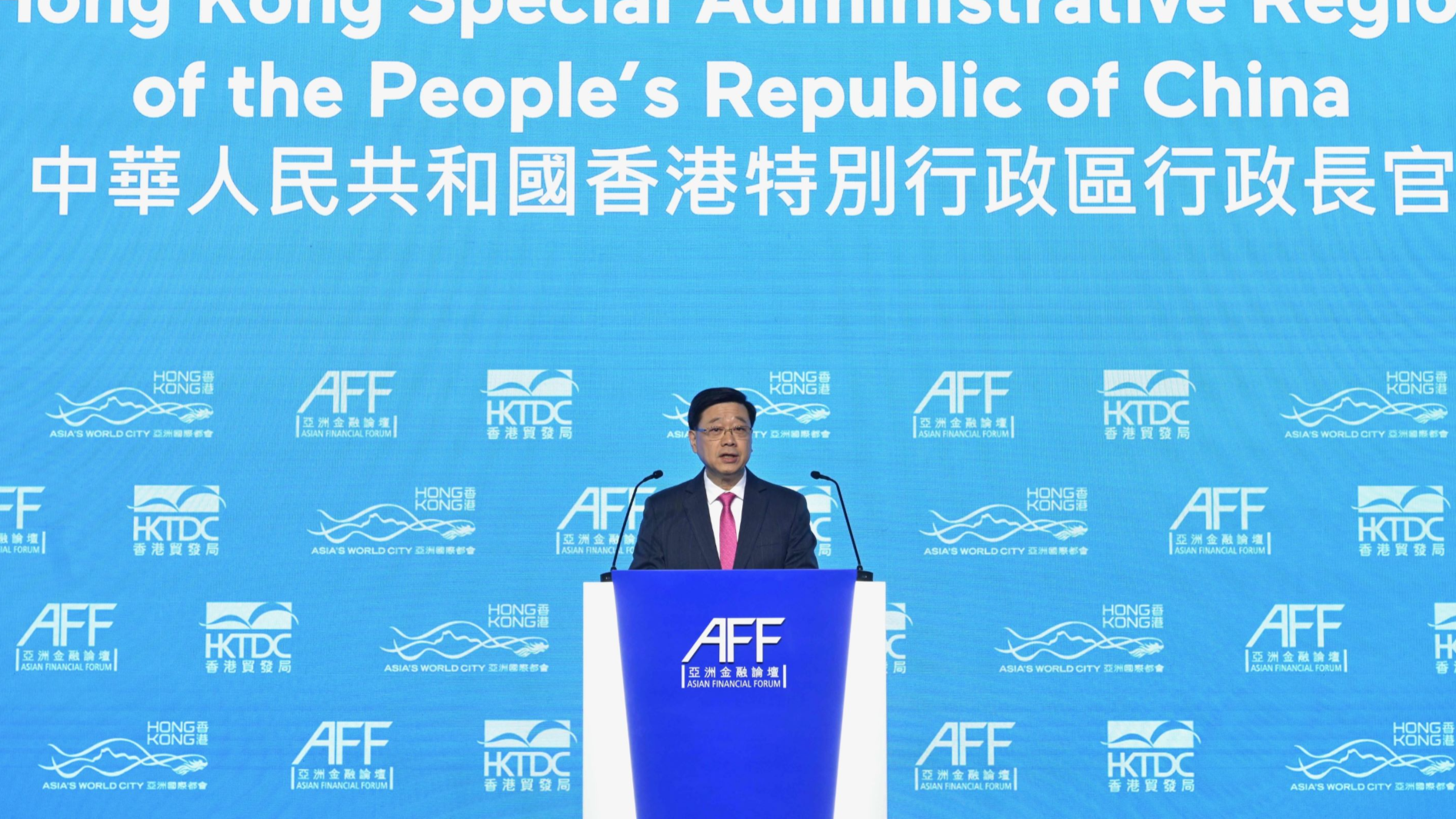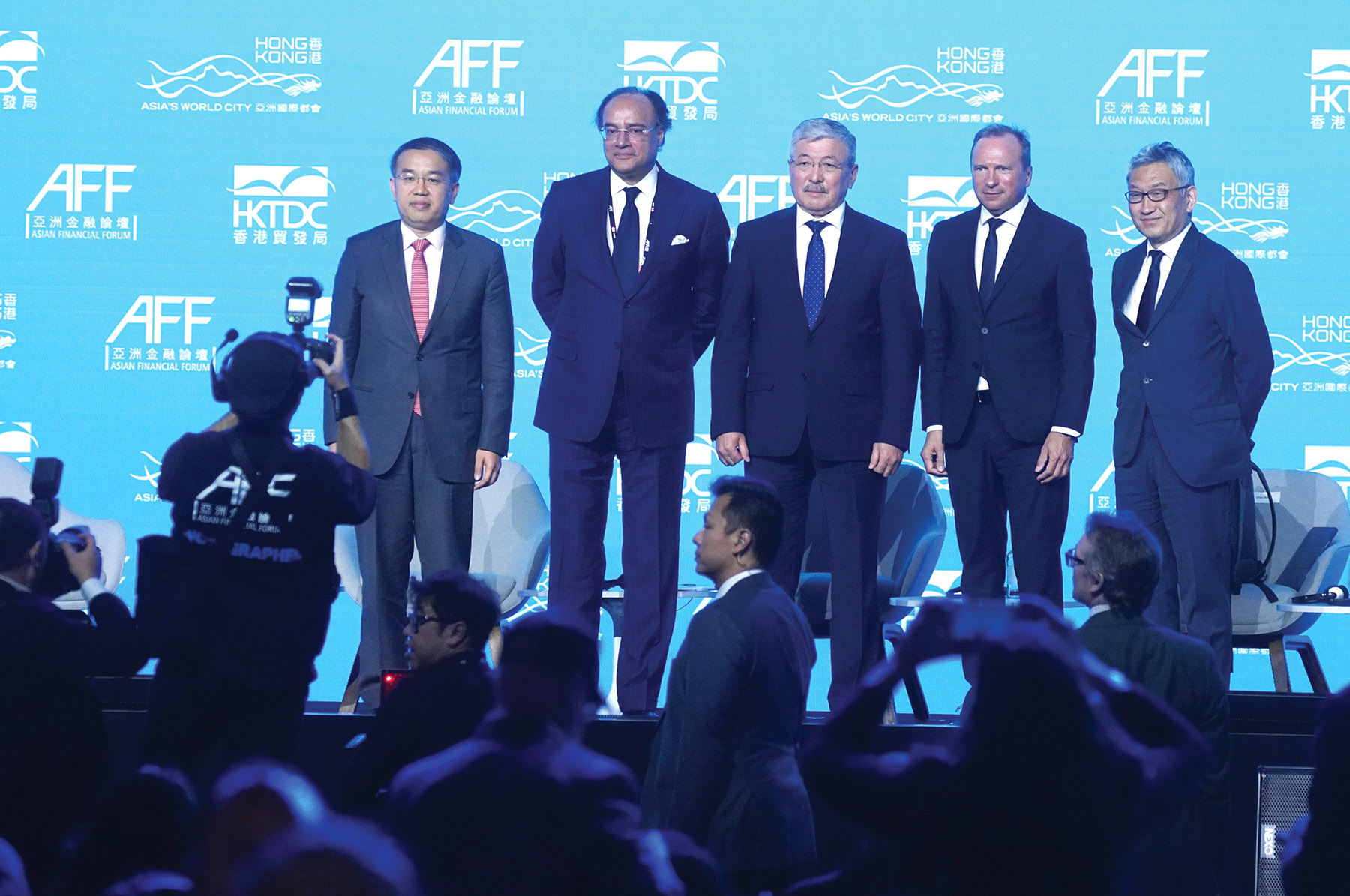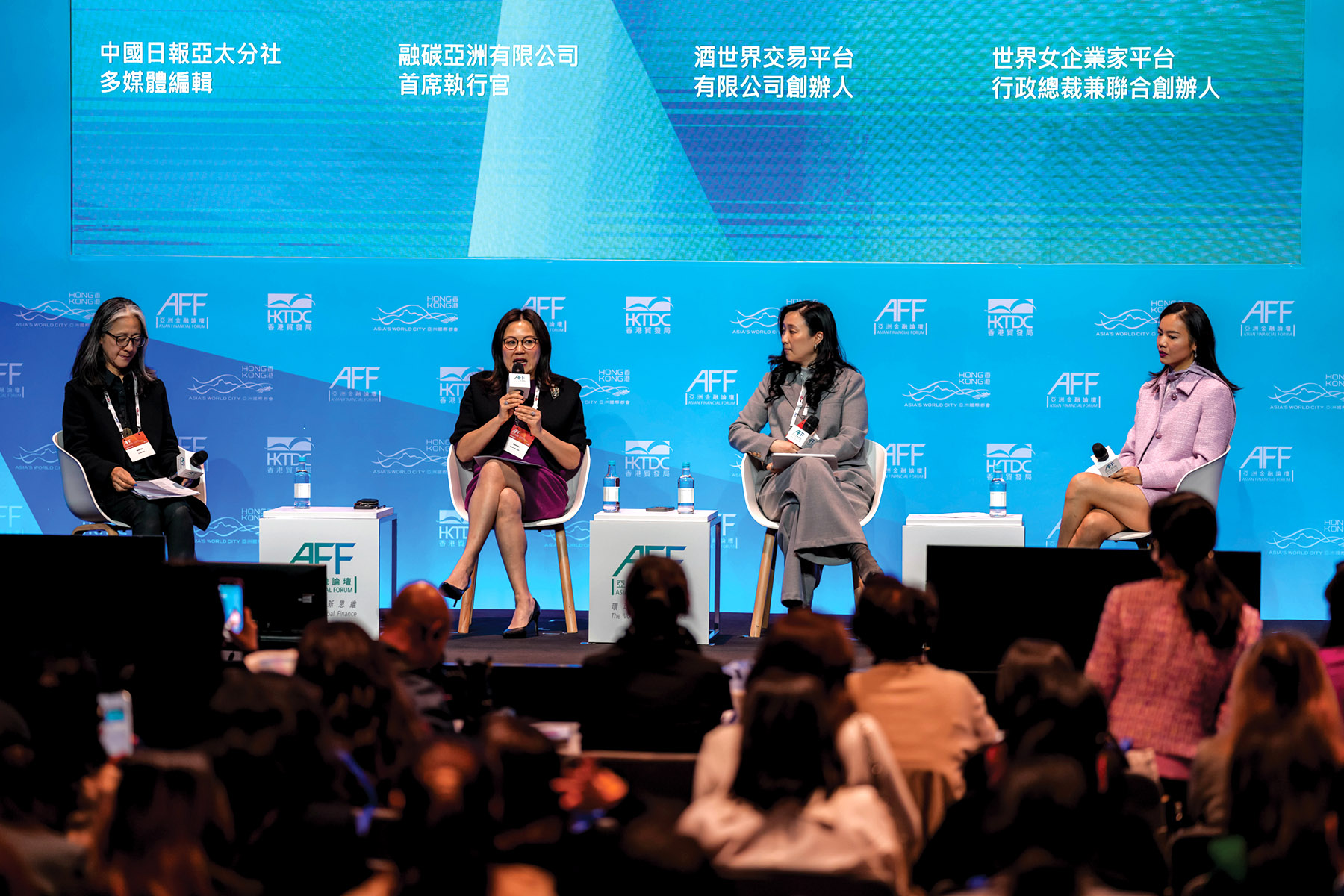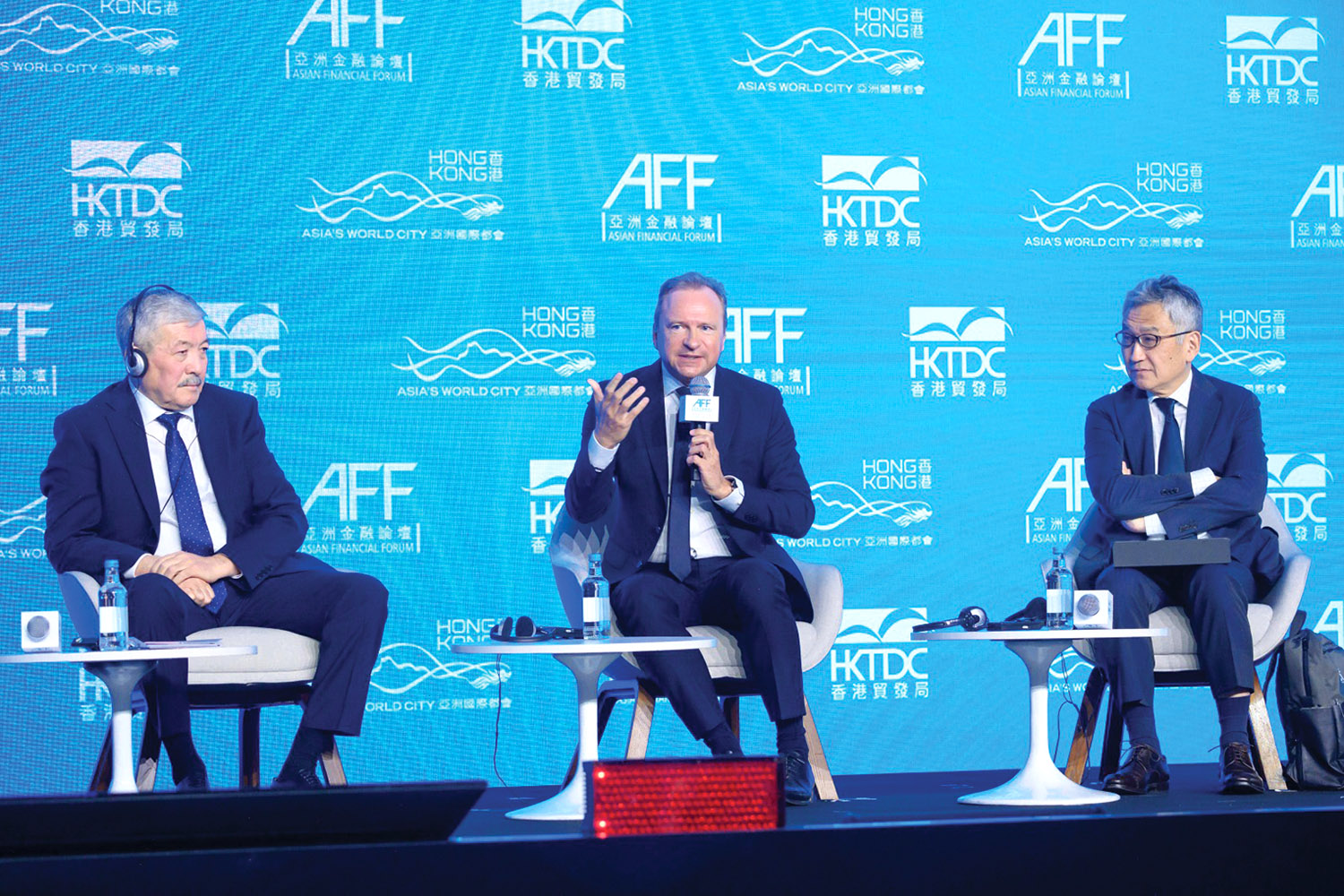GCC and other regions to join SAR in global asset and wealth management, forum hears

The Hong Kong Special Administrative Region’s competitiveness as a global asset and wealth management center will be strengthened, with cooperative support from partners of Asian and other economies, the 18th Asian Financial Forum (AFF) heard in Hong Kong.
In his opening remarks on Jan 13, Hong Kong Chief Executive John Lee Ka-chiu said the HKSAR government has exempted stamp duty on the transfer of shares and units of real estate investment trusts and has boosted the profit tax exemption regimes for funds and single-family offices.
“We are also expanding our mutual access programs with the mainland’s financial markets, such as enhancing southbound trading under the Bond Connect that would allow greater participation by mainland nonbanking financial institutions like securities firms and insurance companies,” he said.
Hong Kong managed about $4 trillion worth of assets in 2023, with net fund inflows up well over three times. The city is also home to 2,700 single-family offices, with over half of these set up by ultra-high-net-worth individuals, each with a net worth of at least $50 million.
Themed “Powering the Next Growth Engine”, the forum has attracted some 3,600 business and financial leaders from more than 50 countries and regions.
Addressing the AFF, China’s central bank governor vowed on Jan 13 to resolutely guard against the risk of the exchange rate overshooting, which analysts said highlighted policymakers’ growing priority of maintaining the general stability of the Chinese currency amid a strong US dollar.
“We will resolutely rectify pro-cyclical market behavior, firmly address actions that disrupt market order, and steadfastly prevent the risk of the exchange rate overshooting, ensuring that the yuan exchange rate remains generally stable at a reasonable, balanced level,” said Pan Gongsheng, governor of the People’s Bank of China.

Pan said that non-US currencies have generally depreciated amid an elevated US dollar index. The yuan also felt the pressure but has demonstrated strong resilience overall.
The PBOC chief said that regulators have “the confidence, the condition, and the capability” to maintain the stable operation of the foreign exchange market. He added that China’s economy is expected to have achieved the annual growth target of around 5 percent for 2024.
Reinforcing Pan’s policy commitment, the central bank and the State Administration of Foreign Exchange raised the macro-prudential adjustment parameter for cross-border financing of corporates and financial institutions to 1.75 from 1.5 on Jan 13.
The Chinese mainland’s economic prowess is buttressing Hong Kong’s status as an international financial hub despite geopolitical tensions, former World Bank chief economist Lin Yifu told the audience, highlighting the city’s pivotal role in channeling cross-border capital flows.
Hong Kong will launch a new yuan-denominated trade finance scheme and expand the hours and scope of its Bond Connect program for Chinese mainland investors, Eddie Yue Wai-man, Chief Executive of the Hong Kong Monetary Authority, said at the AFF.
In his keynote remarks, Gulf Cooperation Council Secretary-General Jasem Mohamed Al Budaiwi described opportunities for cooperation between the GCC and Hong Kong as “bound by historical relations and shared economic values”.
“The cooperation between the GCC countries and Hong Kong reflects a shared vision to promote innovation and sustainability in financial and economic activities around the development of trade, fintech, education, and other vital sectors that form that foundation of a future knowledge-based economy,” he added.

AlBudaiwi said among the current Gulf projects currently being implemented, they are “extremely proud” of the 2,100-kilometer-long railway project linking GCC countries, which is expected to be completed in 2030.
Finance ministers of several countries said they will leverage Hong Kong’s bond market and initial public offering market to access market funds.
In the plenary session, Pakistan’s Federal Minister of Finance and Revenue Muhammad Aurangzeb said the Pakistan government intends to issue euro-denominated bonds in Hong Kong, and that Pakistani companies are interested in listing in Hong Kong to raise funds.
Luxembourg’s Minister of Finance Gilles Roth said that his country has strong ties with the Chinese mainland, with many mainland banks setting up their presence there, involving insurance and reinsurance businesses, and it also has a long-standing relationship with the Hong Kong SAR.
Liu Zhenmin, China’s special envoy on climate change, said the HKSAR can leverage its advantages to empower Asia’s energy transformation through climate finance and make greater contributions to the continent’s energy switch.
During a panel with GCC representatives, Faris Algarni, assistant deputy of policies and legislations development at the Saudi Ministry of Investment, said his country is reforming investment laws that would be introduced next month and promised more financial liberty.
Undersecretary of the United Arab Emirates Ministry of Finance Younis Haji Alkhoori said Hong Kong and the UAE can explore diversifying energy sources and expressed hope to see a Hong Kong-GCC Free Trade Agreement. He also identified areas such as insurance, healthcare, and biotech for the aging population.

Invest Oman CEO Nasser Khalifa Alkindi said his country was reforming a lot of laws to support more investors within Oman and the GCC and one factor of this was how these areas can benefit not only them but Hong Kong and the rest of the world. “One thing we’ve been working a lot on is to enhance our regulation and standards to global standards,” he said, adding that they were ready to collaborate.
Qatar Development Bank CEO Abdulrahman Al-Sowaidi said they “see a lot of overlaps in focus” with Hong Kong’s fiscal balances and budgets, especially in green finance, green aviation, and green tech. He invited those interested to look at Qatar’s free economic zones.
Speaking at the “Forging Regional Capital Markets Collaboration” panel, Abdulaziz bin Hassan, board member of the Saudi Capital Market Authority, underscored the importance of financial cooperation between Saudi Arabia and China. “There is something that the two nations can work together on to make the global economy and productivity more stable,” he said.
Entrepreneurs looking to fund their tech offerings were presented with a slew of ideas on how they can best strategize their approach, including how artificial intelligence (AI) is attracting the lion’s share of investment funds.
Abdulrahman Alolayan, founder and managing partner at Saudi venture capital fund Beta Lab, told a session on Jan 13 — the first day of the two-day annual event — that more than $100 billion, or a third of global investment, went into AI in 2024.

Aysar Tayeb, executive managing director at Prosperity7 Ventures, the venture capital fund of Aramco ventures, noted that though fundraising had declined, when one looks at the regional trend, the fastest-growing ecosystem was in Saudi Arabia, with 40 percent of the venture capital funding of the Middle East and North Africa region happening in that nation.
During a panel discussion on global economic prospects, John Christopher Donahue, president and CEO of Federated Hermes, a Pennsylvania-based investment management firm, said in regard to the question about whether international investors will come back to the mainland and Hong Kong in 2025, “the short answer is yes”.
Antoine Gosset-Grainville, chairman of Paris-headquartered insurance corporation AXA, agreed that more international investors will return, as “Hong Kong offers a unique exposure to the growth on the mainland”.
The presence of female entrepreneurs highlights the importance of resilience, networking, mentorship and maintaining personal growth as they bring innovative and creative perspectives, diversity and inclusion to businesses, delegates said on
Jan 14 at the China Daily Asia Leadership Roundtable, held on the sidelines of the AFF. The roundtable was themed “Empowering Women Entrepreneurs: Transforming Challenges into Breakthroughs”.
During the discussion Grace Hui, CEO of Net Zero Asia, a company focusing on carbon asset development and decarbonization management, said one of the business challenges that female entrepreneurs face is hiring.
Anna Wong, CEO and co-founder of Female Entrepreneurs Worldwide, said there are common misconceptions about gender bias in funding.
Mariana Lam, founder of Wineworld Xplorer, a multimarket wine trading and asset management platform, said: “Women-led businesses contribute to advancing gender equality and women’s empowerment in the workforce and society at large, creating a more equitable and prosperous society.”
Li Xiaoyun, Liu Yifan and Mike Gu in Hong Kong contributed to this report.
Contact the writers at oswald@chinadailyhk.com


